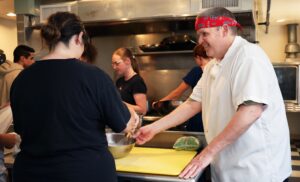Mountain Valley interviews Lisa Rosen, PsyD, about how she helps prepare families for a return to college after an anxiety-based withdrawal.
MV: So, Dr. Rosen, in our last newsletter we discussed how Mountain Valley helps prepare residents and parents for the transition from high school to college. But today we want to hear about the experience of families who have tried college, and it just didn’t work the first time. What’s that like for a family to have to try again after a false start?
Dr. Rosen: Well, there’s no denying that this experience is painful and disorienting for the resident and the parents. The level of anxiety over trying again can be very high, which is why we really focus on “pre-gaming” the return to college very early in the family’s treatment experience. The more pre-gaming we can do, the better. Pre gaming means really digging into the initial experience of college and gleaning insights from that experience for this next attempt, an attempt that includes a whole new set of skills and insights that the young person, and her parents, did not have the first time around. Pre-gaming is our way of getting really practical and concrete about what steps to take to be successful in college. We do this with the resident as a part of their treatment, and we do this with parents to empower them to better support their child’s return to college. This includes teaching them how to navigate their own anxiety!
MV: What are some examples of this support?
Dr. Rosen: We provide two categories of support for the child. First, we explore the setting itself, asking questions together like what supports are available in that setting? Is there enough support at this college? Is this the right setting to optimize this particular young person’s learning? Is this the right school? This kind of analysis is part of the resident’s therapeutic journey at MV. We use the resident’s past experience to look at their future experience from all sides—the social emotional setting and supports, the academic rigor, the learning support. In other words, we have to help the young person become reflective and analytical about the setting they may return to. The other category of support involves, of course, reflection regarding the state of the resident when they had that initial college experience. How much of their struggle was simply driven by what was going on emotionally for them at the time, separate from the external environment. What new skills and insights do they have to bring to this or another college environment?
MV: So, it sounds like you kind of flip the initial “failure” on its head, looking at it as an important source of information and as the beginning of a process of understanding that can form the basis of a successful college experience. To carry your “pre-gaming” analogy forward, is this a little like debriefing an early season loss in sport so that you can improve and succeed going forward, viewing this “loss” as a useful and instructive beginning rather than as an unsuccessful ending?
Dr. Rosen: Yes, and that brings me to the parents. We talk a lot about cognitive distortions as a part of our work with our residents. But this is also very useful in our work with parents. Reframing is an important part of correcting cognitive distortions around what can feel, understandably, like a crisis. Parents may think “our child has been working toward this very specific goal of this very specific college for twelve years and we have had this very linear view of how life is supposed to unfold and suddenly the plan is upended, it’s a disaster.” We help parents reframe this “crisis” as a “challenge” and one that has yielded important data. In terms of empathy for these parents, we know that reframing does not mean denying their feelings—it’s really hard, we know, and it can still feel terrible to the parent and the child. But ultimately, it’s really an opportunity to revisit some initial assumptions, to learn about our patterns and our child’s needs, and craft a more effective strategy for reengaging college.
It’s a balance of empowering the young adult to own their experience and apply new insights to their college experience and it’s also a chance to help parents balance their own role as supports. They are still parents after all, and their college-aged child is part adult and part child and still needs engaged parenting. But we also need to allow space for the child to learn from their own bumps and setbacks.
The pregaming we do helps the parents not only reframe the initial setback of a college withdrawal, it also helps them reframe future setbacks with a more flexible attitude, viewing each success and each setback as an opportunity for growth and learning—as a new and useful data point and an opportunity to practice new skills. It’s a win-win. We win if our kid succeeds. We also win if our kid experiences a setback and is equipped to reflect and say, “you know, mom and dad, here’s what I really need to be successful, here’s what I really care about, here’s what’s not working for me on this campus.”
The years from 18 to 22 may be what we define as “adult,” but what do we really want as parents? We want our kids to succeed from 25 to 80! We have to learn to play the long game here. That’s what we want college to prepare our kids for—a long and positive adult future. With that perspective, what a great opportunity college provides as a relatively safe laboratory to prepare our children for the challenges and opportunities of adulthood. That’s at the core of our pre-gaming and reframing approach to returning to college.


